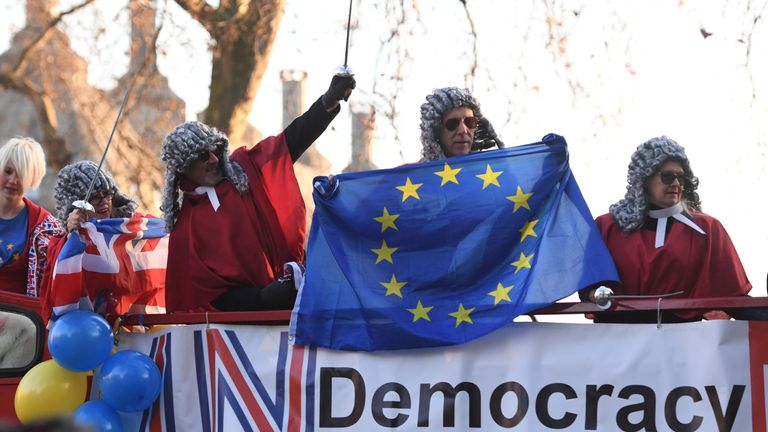Parliament is sovereign, Supreme Court told in Brexit challenge
Ministers cannot remove rights conferred by Parliament, it is argued, as the Government's lawyer warns of a "constitutional trap".
Tuesday 6 December 2016 19:28, UK
The Supreme Court has been told that Parliament must have a say in any attempt to "nullify" the legislation that preceded Britain's entry into Europe, because citizens' rights could be compromised.
On the second day of the historic Brexit hearing at the Supreme Court, Lord Pannick QC, representing businesswoman Gina Miller, said her case "is that the prerogative power to enter into and terminate treaties does not allow ministers to nullify statutory rights and duties".
Ms Miller and another claimant, hairdresser Deir Dos Santos, argue that leaving the EU would remove some of their rights, including free movement within the bloc, and that it should not be done without MPs having a say.
The High Court sided with them last month, ruling that Prime Minister Theresa May must have Parliament's approval to trigger Article 50 of the Lisbon Treaty - the formal process to begin EU divorce proceedings.
Were the Prime Minister to go ahead without getting Parliament's approval, she would be using the royal prerogative.
:: Govt to reveal Brexit plan before EU exit begins
But Lord Pannick, referring to the European Communities Act 1972, said: "There is no relevant prerogative power in this context."
He added that statutory rights and obligations created under the act could not be taken away "without parliamentary approval".
The court was told: "The prerogative cannot be used to remove rights and duties created by Parliament.
"Parliament is sovereign. What Parliament created only Parliament can take away.
"We are submitting that there is simply no prerogative power to interfere, frustrate, nullify a statutory scheme."
:: EU sets 18-month Brexit deadline
Earlier in the day, James Eadie QC, for the Government, warned of long-term implications were the Government to lose the landmark case, and accused the rival camp of walking a "tight rope" and creating a "serious constitutional trap".
He said the Supreme Court would be "imposing, in effect, a new control of the most serious kind in a highly controversial area" if it were to rule against the Government.
Wrapping up the Government's case, he argued that the use of prerogative powers did not undermine Parliament - and that the 23 June referendum on EU membership had been held in the universal expectation that the Government would implement its result.
He told the judges: "Our case fully respects, and offers no affront, to Parliamentary sovereignty."
The QC added: "Parliament is already deeply involved, and unsurprisingly involved, in the whole process of withdrawal."
:: Brexit appeal explained: What's at stake?
However, he also revealed the Government would submit a short bill - "a one-line act" - to Parliament to seek MPs' approval to begin the process of Britain's exit from the EU were it to lose the case.
"It may be that it would lead to all kinds of parliamentary complications and possible additions and amendments but that is the solution," Mr Eadie added.
:: There will be a special programme on Paste BN, including highlights from the second day of the historic challenge, at 9.30pm.



